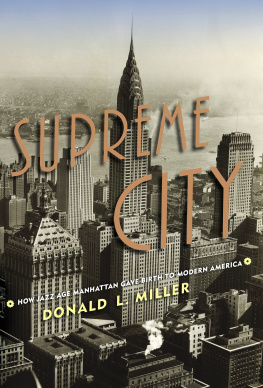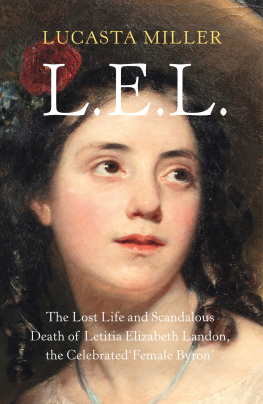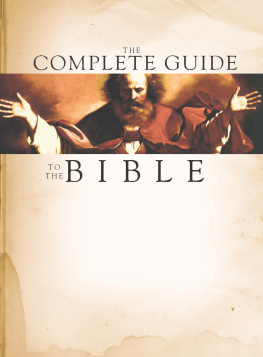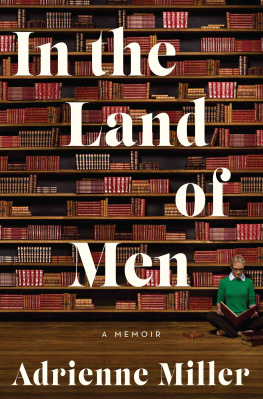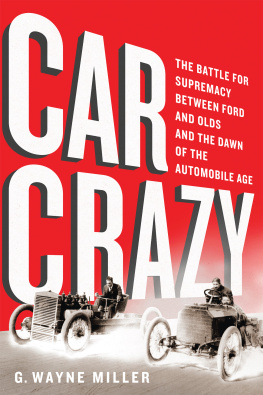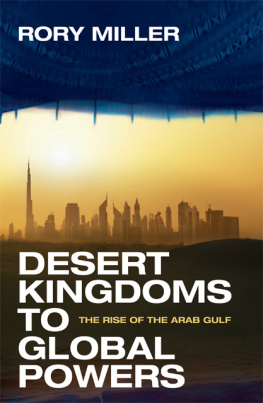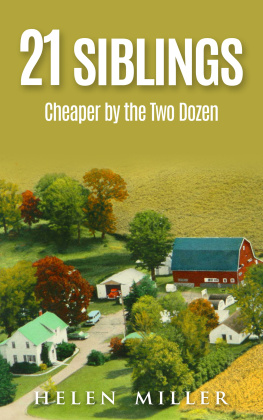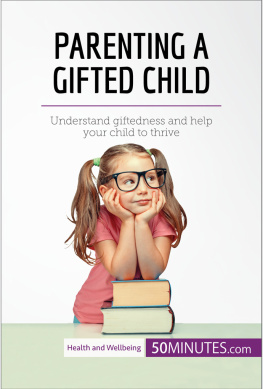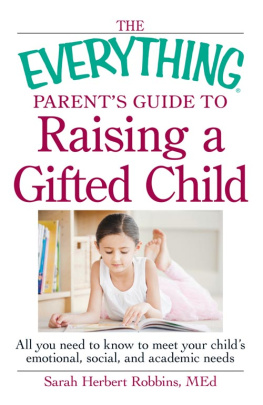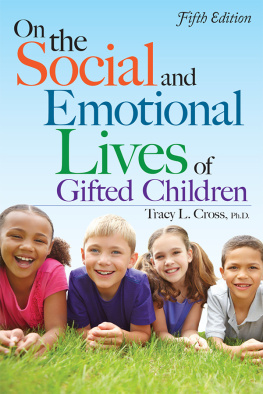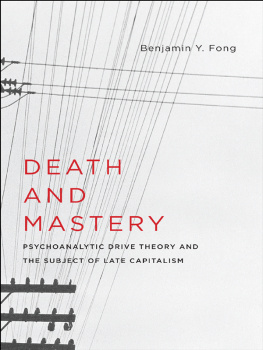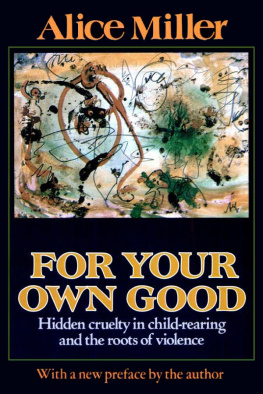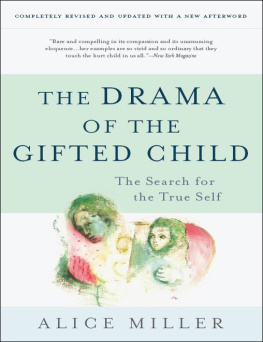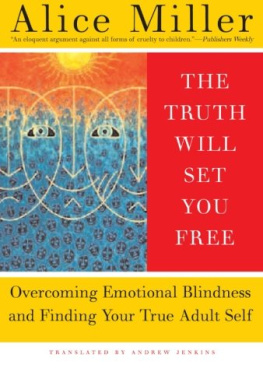Miller - Banished knowledge: facing childhood injuries
Here you can read online Miller - Banished knowledge: facing childhood injuries full text of the book (entire story) in english for free. Download pdf and epub, get meaning, cover and reviews about this ebook. City: New York, year: 1991;2012, publisher: Knopf Doubleday Publishing Group;Anchor Books, genre: Children. Description of the work, (preface) as well as reviews are available. Best literature library LitArk.com created for fans of good reading and offers a wide selection of genres:
Romance novel
Science fiction
Adventure
Detective
Science
History
Home and family
Prose
Art
Politics
Computer
Non-fiction
Religion
Business
Children
Humor
Choose a favorite category and find really read worthwhile books. Enjoy immersion in the world of imagination, feel the emotions of the characters or learn something new for yourself, make an fascinating discovery.

Banished knowledge: facing childhood injuries: summary, description and annotation
We offer to read an annotation, description, summary or preface (depends on what the author of the book "Banished knowledge: facing childhood injuries" wrote himself). If you haven't found the necessary information about the book — write in the comments, we will try to find it.
Banished knowledge: facing childhood injuries — read online for free the complete book (whole text) full work
Below is the text of the book, divided by pages. System saving the place of the last page read, allows you to conveniently read the book "Banished knowledge: facing childhood injuries" online for free, without having to search again every time where you left off. Put a bookmark, and you can go to the page where you finished reading at any time.
Font size:
Interval:
Bookmark:
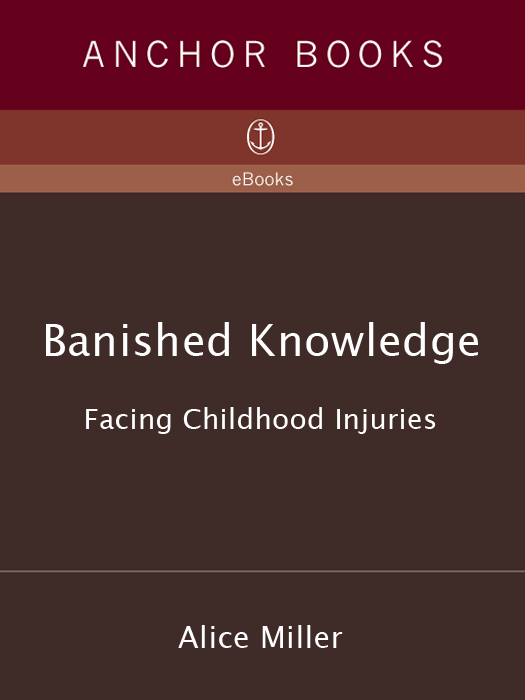
BOOKS BY ALICE MILLER
THE DRAMA OF THE GIFTED CHILD
(originally published as Prisoners of Childhood)
FOR YOUR OWN GOOD
Hidden Cruelty in Childrearing and the Roots
of Violence
THOU SHALT NOT BE AWARE
Societys Betrayal of the Child
PICTURES OF A CHILDHOOD
Sixty-six Watercolors and an Essay
THE UNTOUCHED KEY
Tracing Childhood Trauma in Creativity
and Destructiveness
BANISHED KNOWLEDGE
Facing Childhood Injuries
PATHS OF LIFE
Seven Scenarios
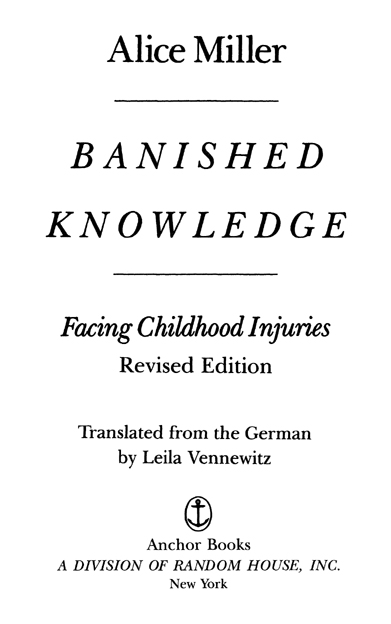
F IRST A NCHOR B OOKS E DITION , O CTOBER 1991
Copyright1988 by Suhrkamp Verlag
Translation copyright1990 by Leila Vennewitz and Alice Miller
All rights reserved under International and Pan-American Copyright Conventions. Published in the United States by Anchor Books, a division of Random House, Inc., New York, and simultaneously in Canada by Random House of Canada Limited, Toronto. Originally published in hardcover in the United States by Nan A. Talese/Doubleday in 1990. This edition published by arrangement with Nan A. Talese/Doubleday.
Originally published as Das verbannte Wissen (3rd Edition) by Suhrkamp Verlag am Main, copyright 1988. Any variations from the original text are a result of the authors wishes.
Grateful acknowledgment is made to the following for permission to quote
from previously published material:
Equinox: Excerpt from Bodywatching by Desmond Morris. Copyright 1985 by
Desmond Morris.
Simon & Schuster, Inc.: Excerpt from The Human Animal by Phil Donahue.
Copyright 1985 by Multimedia Entertainment Inc., and Woodward/White Inc.
Yale University Press: Excerpts from Long Days Journey into Night by Eugene ONeill. Copyright 1955 by Carlotta Monterey ONeill.
Excerpt from Growing Young by Ashley Montagu. Copyright 1981 by Ashley Montagu. Used by permission of the author.
A NCHOR B OOKS and colophon are registered trademarks of
Random House, Inc.
Library of Congress Cataloging-in-Publication Data
Miller, Alice.
[Verbannte Wissen. English]
Banished knowledge/Alice Miller
Translated from the German by Leila Vennewitz.
p. cm.
Translation of: Das verbannte Wissen.
Includes bibliographical references (p. ).
1. Child psychology. 2. Parent and child.
3. Repression (Psychology) 4. Good and evil.
I. Title.
BF721.M539813 1990 90-3081
150.198dc20
eISBN: 978-0-307-81691-7
www.anchorbooks.com
v3.1
The following passage occurs in the Preface to the 2nd edition of Ashley Montagus Touching: The Human Significance of the Skin (New York: Harper & Row, 1986):
One regret that every writer must have is that there does not exist in English a word which specifically refers to both sexes. In this edition I first attempted to remedy that situation by employing it as a substitute for the customary masculine pronouns. The result was an unacceptable impersonality which, combined with the awkward repetitiveness of he or she and his or hers, rendered the change repellent. I, therefore, have adhered to customary usage. It is, of course, to be understood that in all instances both sexes are implied. This book is about human beings, not objects, and no baby is an it to its mother, nor should it be to anyone else.
I wish to express my great appreciation to the author, Dr. Alice Miller, for the close cooperation I have enjoyed with her. I also wish to thank my husband, William, who has accompanied me throughout the work of this translation with his never-failing, expert assistance.


A Saint Nicholas Celebration
Murdering for the Innocence of the Parents
The Wicked Child
A Favorite Fairy Tale of Scientists
Theories as a Protective Shield
Pretending to Want to Know
The High Cost of Lying
Without Truth There Can Be No Help
The Enlightened Witness
The Child Sets Limits
The Way Out of the Trap


UNLIKE ANIMALS, which generally become self-reliant shortly after birth, the human infant remains dependent on others for a very long time. He comes into the world as a bundle of needs, relying totally on the warmth of human arms, watchful eyes, and tender caresses. Incubators and electric heat are merely a very inadequate substitute for human contact, and the touch of cold instruments can be torture. A baby requires the certainty that he will be protected in every situation, that his arrival is desired, that his cries are heard, that the movements of his eyes are responded to and his fears calmed. The baby needs assurance that his hunger and thirst will be satisfied, his body lovingly cared for, and his distress never ignored.
Is that asking too much? Under some circumstances it is much too much, a great burden, while under others it is a joy and an enrichment. It all depends on what the parents themselves experienced in the past and what they have to give. Nevertheless, every child depends on others for the satisfaction of his needs because he cannot look after himself. Although he can scream for help, he relies entirely on those around him to hear his cries, take them seriously, and satisfy the underlying needs rather than, in an excess of hatred, punishing the screams or even preventing them by means of tranquilizers.
The only possible recourse a baby has when his screams are ignored is to repress his distress, which is tantamount to mutilating his soul, for the result is an interference with his ability to feel, to be aware, and to remember.
When this innate ability to feel cannot blossom, a person cannot know later in life what it means, for example, to be defenseless and so is incapable of providing his or her own child with the protection and love in which this child will likewise stand in urgent need. Parents who have never known love, who on coming into the world met with coldness, insensitivity, indifference, and blindness and whose entire childhood and youth were spent in this atmosphere, are unable to bestow loveindeed, how can they, since they have no idea of what love is and can be? Nevertheless, their children will survive. And, like their parents, they too will not remember the torments to which they were once exposed, because those torments, together with the needs related to them, have all been repressed: that is, completely banished from consciousness.
A human being born into a cold, indifferent world will regard his situation as the only possible one. Everything that person later comes to believe, advocate, and deem right is founded on his first formative experiences. Today we have conclusive evidence that this cost of survival not only is much too high for the individual but also turns out to be the greatest threat to all humanity. In the fifties, experiments showed that monkeys separated from their mothers and raised with fabric dummy mothers had no motherly instincts when they later gave birth. And we have statistics showing clear connections between early neglect and abuse and subsequent adult violence. Why is it that hardly any conclusions are being drawn from these statistics? The repression of past torments and its cost render people deaf to the screams of children and blind to the obvious connections. Thus the factors so clearly revealed by the statistics are ignored to block the eruption of once repressed pain, to prevent the recognition of the truth.
Font size:
Interval:
Bookmark:
Similar books «Banished knowledge: facing childhood injuries»
Look at similar books to Banished knowledge: facing childhood injuries. We have selected literature similar in name and meaning in the hope of providing readers with more options to find new, interesting, not yet read works.
Discussion, reviews of the book Banished knowledge: facing childhood injuries and just readers' own opinions. Leave your comments, write what you think about the work, its meaning or the main characters. Specify what exactly you liked and what you didn't like, and why you think so.

